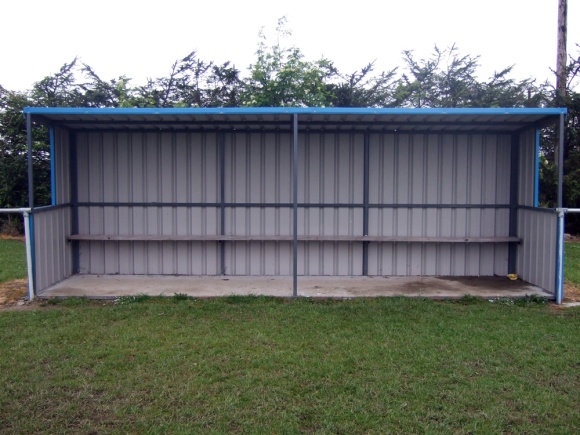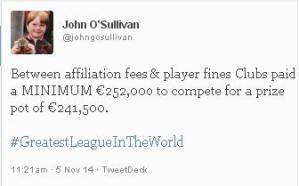
The off-season doesn’t exist, not for you.
The only thing that turns off is income. OK, you have neither player wages nor senior team operational costs, but you have an U19 team, maybe other underage teams too. They’ll need to train. They’re in school or college so it has to be at night; floodlights cost more. Every grass pitch is in bits so it needs to be Astro. A full-size floodlit Astro costs a nice bit. You’ll need one in January anyway when the Senior team are back and they’ll want double sessions. Jesus, you don’t have a home league game until March. You make a note to talk to your landlord about a line of credit for training facilities.
Supporters want an end of season awards ceremony. it won’t make money but you had to book it in June to guarantee a function room. You booked the weekend after the season ends, predicting you wouldn’t reach the FAI Cup Final. If by some miracle you do, the deposit and effort will be gone, but you’d lose it in a heartbeat for a Cup Final. You can’t push it later than that weekend anyway, the players will be on holidays, most will be out of contract and won’t show. You’ll have to put up with the grief supporters give you for the no-shows. You can’t criticise though, you understand the players’ reasons. If it leaks out they couldn’t be arsed attending it’ll only pop up online should they sign back. It’s best to keep everyone happy, you’ll take the ‘constructive criticism’.
You’ve holidays built up, you’ve earned them; you’ve been too busy to take them during the season. It’s November, the weather is brutal but you probably can’t afford to go abroad, somewhere sunny. If you’ve got kids in school, the only weeks they’re free push the cost of time away even higher.
You send out an email and an announcement telling people season tickets make a great Christmas present. You know damn well you’re not spending €200 on your own relations
Season tickets need to go on sale! You open an excel file and work out who you’ve got at home twice next season. Is that better or worse for crowds? You can’t really put up the ticket price, you know that, but the money to ‘kick on’ has to come from somewhere. You consider adding a Euro, but that’ll make a balls at the turnstile and the bank will only do you for lodging coin anyway. You decide against it. You send out an email and an announcement telling people season tickets make a great Christmas present. You know damn well you’re not spending €200 on your own relations. You convince yourself you’ll hold the Season ticket money to January, the first two you sell in November go on the ESB bill that’s already past due.
You wonder how you’ll keep the Club in the public eye over the off-season? Outside of player signings you’ve only got the occasional story that might get picked up. Community appearances are gone, you’ve no players to do them and no-one wants office staff in the picture. There’s always the local lad who’s out of contract but happy to help; you know he’s signing on though and you have to consider if turning up for a photo shoot will be considered “working”; it’ll be in the paper, the lads in the dole office know who he is. It could lead to questions, it’d be unfair on him.
You stress, again, the need to announce new signings on a Tuesday. You explain, again, that it’s the best day to get the local papers to pick it up ahead of print deadlines. You explain, again, that once the locals aren’t scooped they might even carry a photo. The player is signed on Saturday morning and announces it himself on twitter. By the time Tuesday rolls around, it’s old news and becomes a footnote on the Junior Soccer page. You prepare to explain it all again next week.
“We need to go after marketing in a big way next year”. Everyone agrees but “what’ll it cost? What? Can we not get some free coverage? Sure that’s the cost of a player for the season!” You accept it and head back to twitter and facebook. You chance YouTube, other clubs use it well but the time spent isn’t worth the pay-off, you know the 20 hits are from the 20 die-hards who read everything, it’s not hitting new fans. Supporters complain about the lack of marketing. You nod politely. For the sake of a quiet life you listen to their ideas, which you’ve already costed, proposed and had rejected.
“I’m not doing a second set of kit for every lad who has a good Christmas”
The kitman is in. The manager has told him that we’re back the second week in January and he’s in a panic. The manager is targeting a squad of 23, a few lads will come in on trial too. They’ll all need kit. He’s spoken to the kit supplier but hasn’t a clue on sizes. How could he? You’ve got less than half a squad signed. He’s got the kit supplier to agree to send down uncrested kit, so he can return what’s not needed. Brilliant! You could hug him. You warn him not to leave any of the kit out of his sight though. Before he goes he reminds you that he’s “not putting up with that shit from last year, if a fella comes back overweight and needs an XL, he’s in it for the year, I’m not doing a second set of kit for every lad who has a good Christmas”. You know when it comes down to it, he will, so it’s an argument you’ll have to have.
Money’s tight. You’ve got a club lotto, the jackpot is decent, but it’s a throwback to a bygone age, as are the three sellers you’ve got left. Great clubmen, but they’re getting on and you question if it’s right that they’re out in this weather. Younger volunteers don’t want to sell Lotto tickets [neither do you if you’re honest, asking for money from strangers makes you feel like a chugger]. You look up online selling again though you know it needs to be face to face. You consider giving people commission; it might work. You know it won’t, it never has.
We do want four or five TV games of course, but please God, let them be away games.
it’s lashing rain most days but the shoe leather has to be worn down as those responsible for commercial revenue pound the pavements to collect payments and sell next year’s advertising hoardings. We will tell sponsors that we hope to have four to five games on TV, that makes it easier and it could happen. We do want four or five TV games of course, but please God, let them be away games. You get verbal agreements, commitments; you send contracts and invoices, you know nothing is guaranteed. Last year you spent too much time chasing them, how many times did you hear “in this climate”.
The Club licencing pack arrives by registered post. Preparing the licencing submission for the coming season will occupy a lot of time, but it’s not as difficult a task as people would have you believe. There’s a welcome structure to it, you just have to be organised and put the time in. There’s a large amount of information to gather and while deadlines exist, the league office are supportive. Licencing is more an ongoing conversation than anything else and you’ve developed a great relationship with that department in Abbotstown. Anyone who’s ever had a licence questioned knew exactly why long before they went before the Licencing committee. You have a lot of mandates to get signed, some of the roles are voluntary, they probably shouldn’t be.
Your mandate for assistant manager is a gap, the manager is looking for a new one. It’s not an issue in November, but come January, when he’s still looking, you’re getting phone calls telling you “It’s a mandatory requirement” and “there’ll be sanctions”. You pass the message along, you see it’s forgotten as soon as you finish speaking. He wants to talk about players again.
Licencing Infrastructure plans and youth development plans will need to be updated, it’s quicker to do it yourself and then circulate it for review. You remember to put a date deadline on the review, when the manager forgets to review it and spots something he wants changed after you’ve submitted, it’ll save you an argument.
There will be licencing workshops run in Dublin by the FAI. They’re worthwhile but it’s a full day in Dublin, home late and you’re already up the walls. You get a phonecall from Abbotstown that someone has declined a mandatory workshop, it’s a volunteer and in work that day. You move your calendar around, it’s another day gone, but the club has to have a presence. You put a note in your diary to buy a car speaker for the phone, it’ll ring the whole way to Dublin and back.
January 1st. Happy new year, here come the agents, sniffing around
January 1st. Happy new year, here come the agents, sniffing around your promising young players, retained or playing U19. The agents have been speaking with the players’ parents, filling their heads with nonsense. “Don’t stand in the young lads way” you’ll be told. You’re sitting there thinking about the coaches you’ve hired, the structures you’ve put in place and you laugh at the idea that a League Two academy is a step up. The UK club “think he has potential, but need to have him over for a week on trial”. Piss off, if you want him, make an offer. “We don’t have much money.” Sure!
Everything in the media and online [which you keep an eye on] is about players. “Will he, won’t he?” It’s the easiest question in the world; if it’s more money, nine times out of ten, he will.
You lose a good player, supporters are furious as a 32 year old who has three more years earning capacity signs somewhere else for more money. It doesn’t bother you anymore than it bothers the player, you both have to get on with it. You wonder what he’s going to do after he retires, he left school at 15 to go cross-channel, he hasn’t done any coaching badges, he doesn’t have a face for TV. It’s a tough career and the League of Ireland doesn’t set you up for life. You let it go, you’ve only known him 12 months.
Someone is online claiming you offered the player “a pittance”, they claim their source is the club. It’s probably a mate of the player, if not the player himself. Easier to get it out that you left because a club disrespected you. “It wasn’t about the money”. Of course it was about the money.
You phone the other club’s Chairman, you both have a good laugh about the player’s claim
You sit down with a potential signing, the manager wants him but doesn’t want to make it obvious. It’s already obvious by your meeting him. The player is interested, likes what he sees but he has an offer from another club. It’s more than you want to pay. You phone the other club’s Chairman, you both have a good laugh about the player’s claim. The player has bumped the offer up a lot, their Chairman is being cagey though, so they’ve offered him a decent package.
You meet another potential signing who tells you he’s off to the UK for trials. He want’s to give cross-channel a go, says it’s his “dream”. He mentions the clubs he’s heading to, sounds more like a nightmare. He’s on Pro forms and turned 23 during the year, so the club that’s developed him won’t see a penny. That doesn’t bother you, that’s part of the reason you’re talking to him now despite interest twelve months ago. You wouldn’t pay a transfer fee either. He’s young and you wish him well. “Call me if it doesn’t work out” you tell him. It’s unlikely to work out. Hundreds of trial requests cross your desk every year from players and agents. One or two might pique an interest but If the manager hasn’t specifically looked for you to come in, you’re almost certainly not getting an offer. If you’ve invited yourself over, someone’s doing your agent a favour,
Everyone around the table knows it’s guess work
In January the board, financial controller and team manager will meet the FAI for two to three hours at Abbotstown to go through the season’s budget. At this stage the spending column is committed in contracts or known fixed costs. You hope your income projection is a good estimate and not aspirational. It’ll swing wildly based on results on the pitch. You answer probing questions and figures are challenged. We all know they need to be. You talk about the mid-season friendly that’s “nearly over the line”, knowing that it’s not and that the UK club you’re speaking with might not be attractive enough to get 1,000 people into the ground. You’ve done your best, you’re being honest but everyone around the table knows it’s guess work and you’re a couple of injuries, or a postponed game, away from phoning the bank for a loan.
You know pre-season friendlies are a neccessary evil but pre-season trips are not. Training has started well, everyone glad to be back. You’re told “the lads are buzzing, but we need to give them a lift”. Spain, Carton House, Fota House and “bonding sessions” are mentioned. A trip away could “make all the difference to the lads”. The fact that such a trip would cost more than the prize money won for a mid-table finish is irrelevant.
You work out how many people you need in just to cover the officials, you hope it doesn’t rain.
You can’t afford to start the season cold, your crowds might never recover if you lose early matches. High tempo games are needed. If a game is on a neutral venue to save travelling costs for both clubs, you’re directed to find a “great surface” for our “passing game”, but it can’t be on Astro. It’s January in Ireland, so that shouldn’t be a problem.
It costs to open up your own ground, but if the weather holds, you might get a few in. A game is arranged. The visiting team phone late in the day “Can you give us a split towards our costs?”. Everyone is in the same boat, but if you don’t hold fast you won’t break even. You get the game sanctioned by the FAI, meaning you’ve got referee and officials to pay now. You work out how many people you need in just to cover the officials, you hope it doesn’t rain.
The game kicks off. The striker you’ve spent the winter complaining about scores a wonder goal.
You think it might be different this year.
Still, you thank God you’re not in the Setanta Cup.














